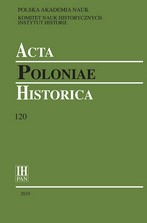A CONDITIONAL PLURALITY OF MEMORY. ORAL HISTORIES OF THE POLISH PEOPLE’S ARMY SOLDIERS (ON THE MARGIN OF THE BOOK ŻOŁNIERZE LUDOWEGO WOJSKA POLSKIEGO. HISTORIE MÓWIONE)
A CONDITIONAL PLURALITY OF MEMORY. ORAL HISTORIES OF THE POLISH PEOPLE’S ARMY SOLDIERS (ON THE MARGIN OF THE BOOK ŻOŁNIERZE LUDOWEGO WOJSKA POLSKIEGO. HISTORIE MÓWIONE)
Author(s): Piotr FilipkowskiContributor(s): Tristan Korecki (Translator)
Subject(s): Review, Military history, Oral history, Political history, History of Communism, Politics of History/Memory
Published by: Instytut Historii im. Tadeusza Manteuffla Polskiej Akademii Nauk
Keywords: oral history; biographical sociology; military history; autobiographical/ collective memory; Second World War; communism;
Summary/Abstract: This essay is inspired by a close reading of the recently published volume Żołnierze ludowego Wojska Polskiego. Historie mówione (Soldiers of the Polish people’s Army. Oral histories) by Jarosław Pałka and Kaja Kaźmierska (Łódź, 2018) and continuously refers to it. Rather than a standard book review, it is a critical essay which positions this publication, and the documentation project standing behind it, in the context of Polish oral history research field. The latter has been expanding dynamically in recent years, gaining more and more recognition also among academic historians. One of its essential characteristics, to which this volume attests, is its methodological anchoring in biographical sociology. This field of research has a long academic tradition in Poland (though its current versions tend to adopt ‘Western’ ideas and research patterns) and offers scientific credibility to, still often insecure, oral history research. The text claims that scientific legitimisation of this kind does not necessarily lead to a convincing interpretation. The method, no matter how neutrally it may be presented, is not free from the authors’ value judgements and non-source-based historical knowledge (and imagination). The text, therefore, suggests a reading of the book – which is vastly a selection of edited, historically footnoted and narratively ordered oral history sources (biographical narrative interviews with the title soldiers) – that partly goes against the authors’ interpretations. Altogether, it makes up an exercise in (oral) historical hermeneutics.
Journal: Acta Poloniae Historica
- Issue Year: 2019
- Issue No: 120
- Page Range: 163-177
- Page Count: 15
- Language: English

